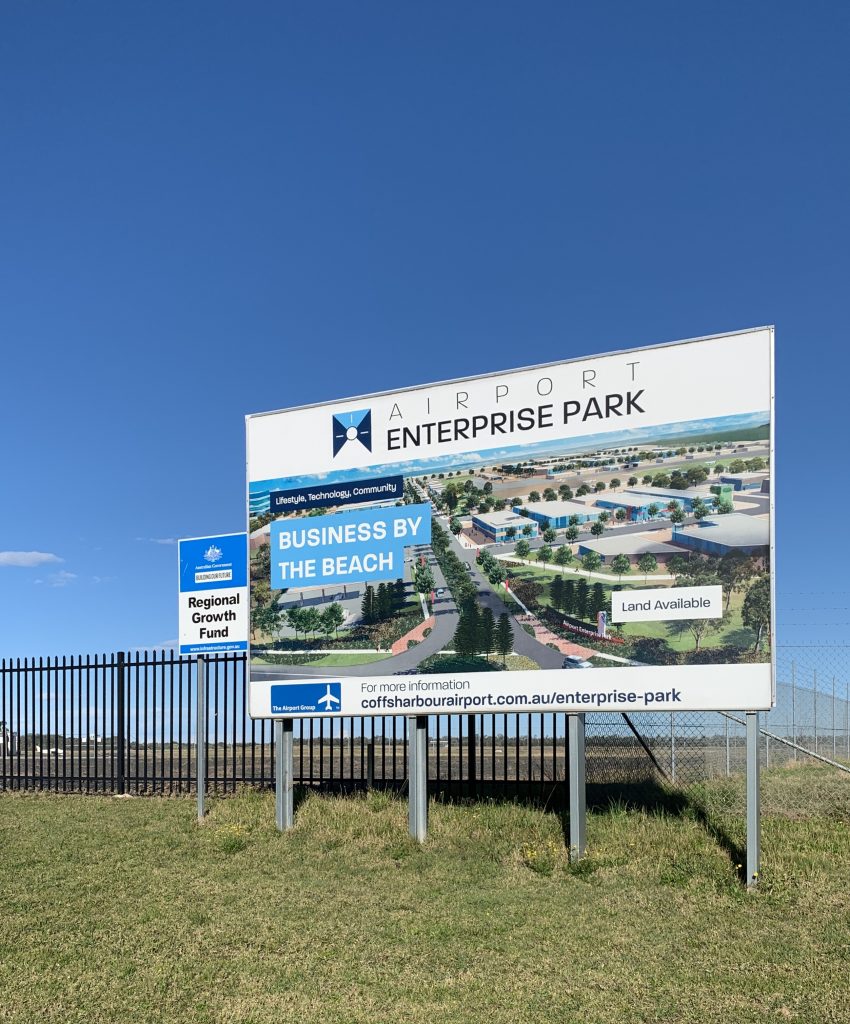
WITH the new lessee of Coffs Harbour Airport and the length of the lease now public knowledge, Coffs Harbour City Council is seeking to rezone the nearby Airport Enterprise Park to attract industrial and high-tech businesses into the area.
Council is currently constructing the approved 98 lot subdivision at Coffs Harbour Airport.
The subdivision application was approved by the Joint Regional Planning Panel in 2017, and will deliver a 43-hectare subdivision yielding 23 hectares of leasable land.
Airport Enterprise Park is currently zoned SP1 Special Activity (Air Transport Facility) under the Coffs Harbour Local Environment Plan 2013 (LEP), and land uses are constrained to airport operations and aviation related uses.
Council is now seeking to lodge a Proponent Led Planning Proposal (PLPP) to request an amendment to the LEP for the subdivision, to rezone the site to allow for further land uses.
The PLPP seeks to create three distinct and well defined zones within the Airport Enterprise Park (AEP) including retaining areas of SP1 zoning, as well as creating a B5 (Business Development) precinct and an IN1 (General Industrial) precinct.
“The current SP1 zoning over the entire subdivision creates limitations on the types of businesses that can establish within the AEP,” a Council report on the rezoning stated.
“A successful rezoning of the AEP subdivision will have a positive impact upon the Coffs Harbour community by providing a greater range of business opportunities within the subdivision and enhance its attractiveness to new business to the region.”
The Northern Regional Planning Panel have been delegated by Council to be the Planning Proposal Authority for the rezoning of the Airport Enterprise Park to resolve Council’s conflict of interest in being both the developer of the Park and the regulatory authority, in relation to the development of the subdivision.
Cr George Cecato said at Council’s latest meeting on Thursday 10 December the rezoning was needed to ensure that Council attracts a “wider suitability of business”.
“We need to complement the SP1 zoning with additional permissible uses,” Cr Cecato said.
“Long ago we seeked and we got conditional approval by the NSW Department of Planning, Industry and Environment; there will be three distinct and well defined zones and our legal advice has been that we remove ourselves.
“Rather than us assessing the planning proposal we delegate that authority to the Minister and we suggest that they appoint the Northern Regional Planning Panel.”
Cr Sally Townley was one of several councillors to express concern over the proposed rezoning.
“If this rezoning proposal is eventually successful I would assume that land would have a much higher market value so I just wonder how we feel about that in view of the fact that we just made arrangements for the lease at a market value of the existing zoning,” Cr Townley asked Council staff at the recent meeting.
Coffs Harbour City Council general manager Steve McGrath said the potential Airport Enterprise Park rezoning formed part of the Airport lease negotiations.
“That was all part of the negotiations, and the values that were attributed were based on achieving a certain zoning outcome along the line and that’s why the proposal in a draft form was shared with the lessee,” Mr McGrath said.
“It has been factored into.”
Mr McGrath said the vision was for high-tech businesses to take up space within the Airport Enterprise Park.
“They’re the sort of businesses that we want to attract to assist the City in its growth,” he confirmed.
“Employment generation activities is the primary purpose of the Airport Enterprise Park zone.”
Cr Paul Amos and Cr Michael Adendorff questioned what businesses were permissible in a B5 Business Development zone.
“I’m thinking that the composition of this Enterprise Park needs more scrutiny because it sounds like we can have a car yard sitting at an entry to our City,” Cr Amos said.
“What we see here now is an Enterprise Park, just with those very words people are not thinking car yards.
“I think this needs more thought.”
Council staff stated that under the Coffs Harbour Airport lease arrangement Council has retained responsibility to develop the Airport Enterprise Park.
“It (Council) is the one who has received the grant funds from both the Federal and State Government and it is responsible for filling those grant deeds,” Council staff stated.
“When the Airport Enterprise Park has been developed it will then be the lessees responsibility.”
General manager Steve McGrath confirmed that development applications for businesses within the Airport Enterprise Park will still need to be lodged with Council for approval.
“The only role that the NRPP is being asked to take on in this particular issue is to handle the gateway proposal, the rezoning, once that’s achieved it’s like any other land in Coffs Harbour,” Mr McGrath said.
“Development applications need to be lodged with Coffs Harbour City Council and processed, so Council does have a say through that process ultimately.”
Councillors resolved to request the Minister for Planning to appoint the Northern Regional Planning Panel to be the Planning Proposal Authority for the Proponent Led Planning Proposal-Request to Amend Local Environmental Plan 2013 for the Coffs Harbour Airport Enterprise Park, and amend the lodgement for the Proponent Led Planning Proposal-Request to Amend Local Environmental Plan 2013 for the Coffs Harbour Enterprise Park.
The B5 Business Development zone is for business, warehouse and specialised retail premises uses that require a large floor area such as warehouses or distribution centres, specialised retail premises, hardware and building supplies, landscaping material supplies and garden centres.
The IN1 General Industrial zone caters for businesses like those in the South Coffs Industrial area including agricultural produce, depots, funeral homes, garden centres, general industries, kiosks, landscaping material supplies, light industries, fuel depots, neighbourhood shops, places of public worship, takeaway food, timber yards, vehicle sales etc.
By Emma DARBIN
